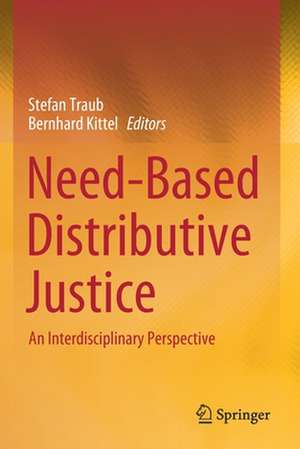Need-Based Distributive Justice: An Interdisciplinary Perspective
Editat de Stefan Traub, Bernhard Kittelen Limba Engleză Paperback – 30 apr 2021
In seven chapters, eleven scholars from the fields of philosophy, psychology, sociology, political science and economics outline the normative and positive building blocks of such a theory by critically reviewing the literature on distributive justice from their respective disciplinary perspectives. They address important theoretical and practical issues concerning the rationality of needs identification at the individual level and the recognition of needs at the societal level. They also investigate whether and how the dynamics of distribution procedures that allocate resourcesaccording to the need principle leads to social stability, focusing on the economic incentives that arise from need-based redistribution. The final chapter provides a synthesis and outlines a framework for a theory of justice based on ten hypotheses derived from the insights presented.
| Toate formatele și edițiile | Preț | Express |
|---|---|---|
| Paperback (1) | 940.87 lei 6-8 săpt. | |
| Springer International Publishing – 30 apr 2021 | 940.87 lei 6-8 săpt. | |
| Hardback (1) | 946.87 lei 6-8 săpt. | |
| Springer International Publishing – 30 apr 2020 | 946.87 lei 6-8 săpt. |
Preț: 940.87 lei
Preț vechi: 1147.41 lei
-18% Nou
Puncte Express: 1411
Preț estimativ în valută:
180.03€ • 188.47$ • 148.97£
180.03€ • 188.47$ • 148.97£
Carte tipărită la comandă
Livrare economică 05-19 aprilie
Preluare comenzi: 021 569.72.76
Specificații
ISBN-13: 9783030441234
ISBN-10: 3030441237
Ilustrații: VII, 208 p. 3 illus.
Dimensiuni: 155 x 235 mm
Greutate: 0.31 kg
Ediția:1st ed. 2020
Editura: Springer International Publishing
Colecția Springer
Locul publicării:Cham, Switzerland
ISBN-10: 3030441237
Ilustrații: VII, 208 p. 3 illus.
Dimensiuni: 155 x 235 mm
Greutate: 0.31 kg
Ediția:1st ed. 2020
Editura: Springer International Publishing
Colecția Springer
Locul publicării:Cham, Switzerland
Cuprins
Perspectives for a Theory of Need-based Distributive Justice.- Need-based Justice from the Perspective of Philosophy.- Identifying Needs: The Psychological Perspective.- Need-based Justice: A Sociological Perspective.- Collective Decisions on Need-based Distribution: A Political Science.- Need-based Justice and Distribution Procedures: The Perspective of Economics.- Towards a Theory of Need-based Justice.
Notă biografică
Stefan Traub is a Professor of Behavioral Economics at Helmut-Schmidt-University in Hamburg (Germany). He is the spokesperson of the research group “Need-based justice and distributive procedures” (FOR 2104) funded by the German Research Foundation (DFG), the Austrian Science Fund (FWF) and the Swiss National Fund (SNF). His research focuses on the economics of inequality and distribution, social preferences, and decision making under risk. He has published in leading journals, like the Journal of Public Economics, Games and Economic Behavior, and European Economic Review.
Bernhard Kittel is a Professor of Economic Sociology at the University of Vienna (Austria) and principal investigator of the research group “Need-based justice and distributive procedures” (FOR 2104). His current main research interests are justice attitudes, group decision-making, and marginal groups in the labor market. He has published papers in various leading journals, most recently in Plos One, Social Science Research, the Journal of Public Economics, Political Research Quarterly, the Annals of the American Academy of Political and Social Science, and Sociological Inquiry.
Textul de pe ultima copertă
This book explores the foundations and potential of a theory of need-based distributive justice, supported by experimental evidence. The core idea is that need-based distributive justice may have some legitimatory advantages over other important principles of distribution, like equality and equity, and therefore involves less dispute over the distribution and redistribution of scarce resources.
In seven chapters, eleven scholars from the fields of philosophy, psychology, sociology, political science and economics outline the normative and positive building blocks of such a theory by critically reviewing the literature on distributive justice from their respective disciplinary perspectives. They address important theoretical and practical issues concerning the rationality of needs identification at the individual level and the recognition of needs at the societal level. They also investigate whether and how the dynamics of distribution procedures that allocate resources according to the need principle leads to social stability, focusing on the economic incentives that arise from need-based redistribution. The final chapter provides a synthesis and outlines a framework for a theory of justice based on ten hypotheses derived from the insights presented.
Caracteristici
Offers interdisciplinary perspectives on distributive justice Critically reviews and consolidates the theories of need and need-based distributive justice Explores the prospects a new theory of need-based distributive justice supported by experimental evidence
